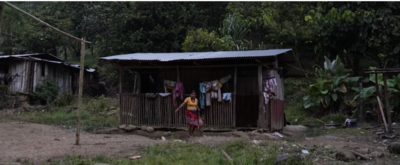
Embera community members are seen as they returned to their ancestral territory and reunited with relatives after staying for about two years in Bogota due to forced displacement while fighting against the inclement cold, hunger, and socioeconomic difficulties, in Pueblo Rico, Colombia, December 2, 2021.
The length of the journey from the sun-scorched Malian lowlands to Colombia's sprawling high-altitude capital wasn't lost on Ibrahima Coulibaly, a longtime leader of the National Coordination of Peasant Organizations of Mali. He is one of 500 activists, academics, and policymakers from 69 countries converging in Bogotá this week to take stock of the state of global land grabbing and define tactics for the way forward.
"We have been engaged in the fight against land grabbing in our community for many years," offered Coulibaly. "And it is equally important for us to articulate our struggles at the international level to carry out the political work necessary to see change."
Mali made headlines as a hotbed of the global land grab in the wake of the 2008 food price crisis when massive tracts of its arable red earth were swept up by foreign investors. The ensuing rural devastation and displacement reflected a bleak new reality for peasant communities throughout the Global South. At the time, Mali had not passed a land law of its own, and a legal hangover from colonial times stipulated state ownership over land. So when foreign agribusiness came knocking, large-scale land deals were easily rolled out across the countryside. Mali's peasant movement resisted, winning a partial victory when it helped put forward agrarian legislation in 2017 that halted some of its most notorious land grabs. But the battle is far from over.
A critical way that local communities work to win back land is through social movements that are active at the global level.
A decade after its apex, the global land grab has slipped out of the spotlight. Rather than having become any less of a problem, a growing number of activists and scholars argue that the current land rush is becoming increasingly complex and entrenched.
"While communities in many countries are still having their land expropriated for large-scale farming, there are also land grabs for energy, carbon, conservation, and infrastructure, with major impacts on livelihoods and human rights," said Ian Scoones, a professor at the University of Sussex.
"Today's land grabs overlap with the most dangerous issues on the planet, including a resurgence of authoritarian politics and the escalating climate crisis," he added.
Colombia is a microcosm of these dynamics, and its selection as the host country of the global gathering organized by the Land Deal Politics Initiative scholar-activist network carries significant political weight. In the 50 years of armed conflict that came to an end with the Colombian peace accord of 2016, some 8 million peasants and Indigenous peoples were displaced across 6 million hectares in multiple iterations of land grabs. Colombia's new government is amenable to resolving these damages; however, the process to implement comprehensive rural reform as outlined in the peace agreement has been arduous.
"Land grabbing, armed conflict, and climate change are interconnected in a cycle that deeply affects rural communities and the environment in Colombia," said Jhenifer Mojica, the minister of agriculture. "The concentration and hoarding of land has generated structural inequality, and is the main reason for violent conflict across the country. It has exacerbated the displacement of rural and Indigenous communities from their territory, so we must put into place policies that stop land grabbing and democratize land access to ultimately achieve peace and stability."
Puerto Gaitán, Meta, is one of many cases in Colombia where land grabs have reached a boiling point—resulting in a standoff between Mennonite settlers of European origin and the local Sikuani Indigenous peoples. According to the Mennonites, who have been in the area for less than a decade, the fertile earth of Puerto Gaitán is a promised land on which to grow corn and soybeans. For the Sikuani, however, these actions amount to an unequivocal land grab—made worse by existing agribusiness operations exporting "flex crops" like palm oil that can withstand market fluctuations because of their multiple functions as food, animal feed, and fuel.
The Sikuani people have filed a case with the government of Colombia, which, unlike some neighboring countries in Latin America, does not cap the amount of land foreigners can own. Even if the peace accords are able to stop internal land grabs, external ones loom large—making any real peace with justice all but impossible. At present, some 1.4 million hectares are controlled by 30 corporations.
"They are only interested in selling the harvest to make more money, but for us, this land is territory," said Jaime Ortiz, a Sikuani leader.
"We are asking the state to return our motherland back to us," added Héctor Estrada, who is also Sikuani.
A critical way that local communities work to win back land is through social movements that are active at the global level.
"Peasant movements play a key role in organizing the solidarity necessary to defend communities that are threatened by land grabs," explained Morgan Ody, a French vegetable farmer and general coordinator of La Vía Campesina. "This resistance often involves joining forces between Indigenous peoples, environmental organizations, feminist movements, and human rights defenders."
The International Conference on Global Land Grabbing in Bogotá this week is a step towards strengthening such alliances across social justice movements, as well as between movements and politically aligned researchers and policymakers. This gathering will help expose the grave risks of a new global land rush and explore options for collective resistance.













